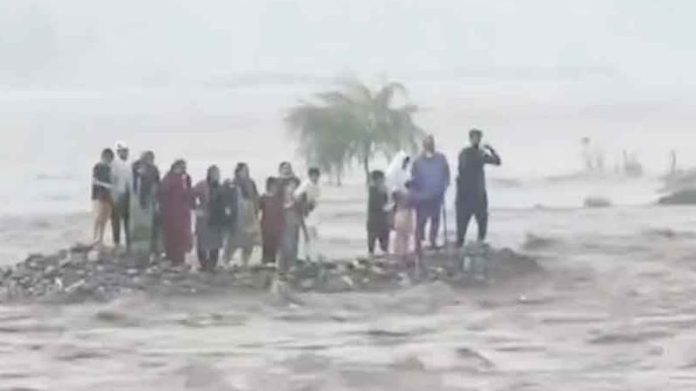EDITORIAL/ISLAMABAD POST JUNE 30,2025
The tragic incident in Swat, where 15 people, including 13 members of a single family, lost their lives after being swept away by a sudden surge in the river, is a heart-wrenching reminder of systemic failures in governance, disaster preparedness, and public safety. The victims, standing in the middle of the river to enjoy the water, were caught off guard by a powerful wave, leaving them helpless against the raging currents. Bystanders watched in horror but were unable to intervene, and the authorities failed to mount an effective rescue operation. This catastrophe raises serious questions about the role of the government, the efficiency of disaster management institutions, and the irresponsible politicization of human suffering.
The first and most painful reality is that this tragedy could have been avoided. Rivers, especially in mountainous regions, are unpredictable. A calm waterway can turn deadly within seconds due to upstream rainfall or dam releases. The family’s decision to stand in the middle of the river was a grave misjudgment, but the question remains: where were the warning signs, the public awareness campaigns, or the enforcement of safety measures? In developed countries, dangerous water bodies are marked with clear warnings, and authorities actively prevent people from venturing into hazardous zones. In Pakistan, such precautions are either absent or ignored.
The Khyber Pakhtunkhwa (KP) government’s response to the incident has been shockingly inadequate. Beyond the symbolic removal of a deputy commissioner, there has been no substantial action—no policy review, no safety reforms, and no accountability for the broader administrative lapses. The KP government, like many others in Pakistan, is mired in corruption and inefficiency, with little focus on actual governance. Instead of ensuring public safety, it has allowed negligence to persist, leading to avoidable deaths.
The Pakistan Disaster Management Authority (NDMA) also failed miserably. The very purpose of such an institution is to anticipate, mitigate, and respond to disasters. Yet, in this case, there was no early warning system, no rapid response team, and no visible effort to prevent such incidents. If the NDMA cannot fulfill its basic mandate, it raises the question: why does it exist at all? The institution must either be overhauled with competent leadership and resources or disbanded to save taxpayers’ money.
What makes this tragedy even more disgraceful is the political opportunism that followed. Opposition parties, instead of presenting constructive solutions or holding the KP government accountable on merit, resorted to cheap point-scoring. None of them have explained what measures they would have taken to prevent such an incident in their own provinces. The victims were not just statistics—they were Pakistani citizens whose lives were cut short due to collective negligence. Exploiting their deaths for political gains is morally reprehensible.
The Swat tragedy is not an isolated incident but a symptom of Pakistan’s chronic governance crisis. From poor urban planning to inadequate disaster preparedness, the state has repeatedly failed its citizens. Floods, heatwaves, and building collapses claim lives every year, yet no long-term solutions are implemented. The lack of enforcement, corruption, and bureaucratic apathy ensure that such tragedies will keep recurring.
To prevent future disasters, the following steps must be taken immediately:
1: Strict Enforcement of Safety Measures – Dangerous rivers and tourist spots must have clear warnings, barriers, and patrols to prevent people from entering hazardous areas.
2: Revamping Disaster Management Authorities – The NDMA and provincial disaster management agencies must be restructured with professional leadership, proper funding, and real operational capacity.
3: Public Awareness Campaigns – Citizens must be educated about the risks of natural water bodies, especially in mountainous and flood-prone regions.
4: Political Responsibility Over Point-Scoring – Leaders must prioritize governance over blame games. Constructive criticism is necessary, but exploiting tragedies for political mileage is unacceptable.
5: Judicial Inquiry and Accountability – An independent judicial inquiry should investigate the lapses in this incident and hold responsible officials accountable, not just with suspensions but with legal consequences.
The Swat River tragedy is a painful reminder of how negligence, poor governance, and institutional failures cost lives. The victims deserved better—better safety measures, better emergency response, and a government that prioritizes their welfare over political squabbles. If Pakistan is to avoid such disasters in the future, serious reforms must be implemented. Otherwise, we will keep mourning more lives lost to preventable tragedies. The time for action is now—before the next wave comes.

















